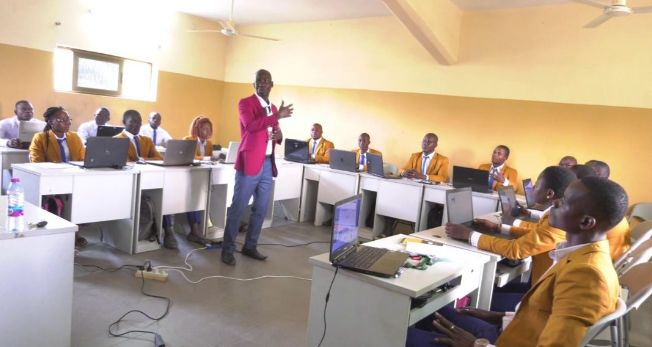EDUCATION SCHOOL IN TOGO _ ANALYSIS OF MANAGEMENT STYLES ACCORDiNG To THE TYPES OF CHIEF ( sencors)

Throughhout the 2021_2022 school year, our editorial staff has set up through these correspondents
throughhout national territory, a system of collecting information on management style developped
in school according to a type of leader.
Thus, the analysis allowed us to distinguish 4 types of management practiced in primary, secondary
general and technical institutions including private and public.
Management is defined as conduct, leadership, derection of administrative staff and teachers by a
headteacher or his deputy ( censors).
Any director , provisional, censor has his own style of management, whether adoped to the
participative or more authoritarian method.
His style is built in his personality, the identité the
objectif of school institutions and sometime the styles embodied by the minister in charge of this
sector.
What are the 4 main style of school management in Togo ?
What are the strenghs and weaknesses ?
What skills are needed to embody a particular style of management ?
The management of the chief
It is referred to as authoritarian management. Here the head of establishment in charge grands
himself maximum power.
The director, pricipal,or censor strictly directs his troops by publishing his rules subtly inspired by the
lequal framework and by aiming for a product object that he often uses for his personal interrest.
The strenghs of directive management Accelerate decision- making efficiency and high
performance.
The weak point undeniable the management style that generate the most discomfort, conflits and
other difficulties.
Rational difficulties within the team and therefore within the establishment
.Teacher and collaborators have a lower motivation as well as a loss of sens of their mission.
In addition we noted that in private establishment,this way of directing requiert many procedure in
other to frame the work of teachers supervising,censor and the very operation of the establishment.
In public establishment, the head, the censor,headteacher who engage in directive management have
in dispositions such as authorities, naturalness, leadership or real expert in field lazy (over 80%) the
are the zealous , the politiciens,the proud haughty and smug.They are often zealous politicians,
haughty and smug augurs.
The persuasive management.
Paternalistic, headteacher are strongly involved in decision-making while keeping a human side. He
mobilizes his troops, employees are more involved in the life of The establishment. their opinion is
taken in consecration, even if it retains the power of final decision on certain subjects in accordance
with the provisions of the legal
Less authoritarian than the president, this male management remains relatively closed.
Advantages In these schools, authority and benevolence induce a feeling of belonging to a team, a certain loyalty and contain cohesion. interpersonal conflicts are less numerous and/ more easily appetizing.
Disadvantages Infrequently, this male management space of freedom is relatively hidden and is observed in certain establishments in the peri-urban areas of Lomé and semi-urban areas outside the country.
Leaders who opt for the non-persuasive have charisma, an ability to convince and maintain emotional intelligence, active listening, they are responsible and enterprising politicians Hidden with important income generating activities.
Delegated management
This style of management, sometimes called <advisory management>, offers a wide margin of maneuver to the censor, teachers and supervisors who are regularly consulted by opinion and decision-making and strongly involved in the life of the team while keeping the objectives very focused on results. Director/censor or principal are appropriately delegated in order to maximize the motivation and efficiency of these employees.
Avantages
In the establishment where the delegative management is used, we noted an increased motivation of the teachers a cohesion of the team, an improvement of the beneficial work, the responsibility Of the collaborators. In addition, communication is more used there. Strengths.
The advantages of such a management style are not lacking: » empowerment » Teachers especially in the private sector, increased motivation, sense of work, responsibility, tenfold autonomy, excellence, talent management. Collective intelligence is used to train learners, Thus multiplying the institution’s innovation and competition. Change management is made easier. Feedback is widely used to take the pulse of his team. Everyone can express their leadership in turn. Performance and benevolence are the bet. Weak points There is a certain drift and letting go in the behavior of certain teachers, hence the need to sufficiently train directors, principals and censors in this type of direction. Moreover, decision-making is slowed down due to the consultation of various actors, which is disabling, especially in times of crisis or emergency. At the head of schools where we have observed the use of participatory management, leaders have a sense of collective relationships, a vision, confidence in themselves and in themselves. They do not run after graduates or behind union political ambitions or student positions but resolutely concentrate on their work. We recall that we were able to make these classifications based on the work of American psychologist RENSIS LiKERT It is urgent to truly train directors, principal censors for more efficiency in the management of schools in accordance with the government roadmap 2020_2025.





